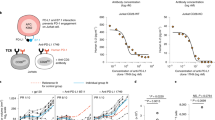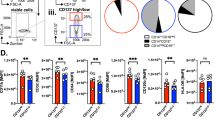Abstract
Suppression of dendritic cell function in cancer patients is thought to contribute to the inhibition of immune responses and disease progression. Molecular mechanisms of this suppression remain elusive, however. Here, we show that a fraction of blood monocyte-derived myeloid dendritic cells (MDCs) express B7-H1, a member of the B7 family, on the cell surface. B7-H1 could be further upregulated by tumor environmental factors. Consistent with this finding, virtually all MDCs isolated from the tissues or draining lymph nodes of ovarian carcinomas express B7-H1. Blockade of B7-H1 enhanced MDC-mediated T-cell activation and was accompanied by downregulation of T-cell interleukin (IL)-10 and upregulation of IL-2 and interferon (IFN)-γ. T cells conditioned with the B7-H1–blocked MDCs had a more potent ability to inhibit autologous human ovarian carcinoma growth in non-obese diabetic–severe combined immunodeficient (NOD-SCID) mice. Therefore, upregulation of B7-H1 on MDCs in the tumor microenvironment downregulates T-cell immunity. Blockade of B7-H1 represents one approach for cancer immunotherapy.
This is a preview of subscription content, access via your institution
Access options
Subscribe to this journal
Receive 12 print issues and online access
$209.00 per year
only $17.42 per issue
Buy this article
- Purchase on Springer Link
- Instant access to full article PDF
Prices may be subject to local taxes which are calculated during checkout




Similar content being viewed by others
References
Banchereau, J. & Steinman, R.M. Dendritic cells and the control of immunity. Nature 392, 245–252 (1998).
Zitvogel, L. et al. Therapy of murine tumors with tumor peptide-pulsed dendritic cells: dependence on T cells, B7 costimulation, and T helper cell 1-associated cytokines. J. Exp. Med. 183, 87–97 (1996).
Zitvogel, L. et al. IL-12-engineered dendritic cells serve as effective tumor vaccine adjuvants in vivo. Ann. NY Acad. Sci. 795, 284–293 (1996).
Mayordomo, J.I. et al. Bone marrow-derived dendritic cells pulsed with synthetic tumour peptides elicit protective and therapeutic antitumour immunity. Nat. Med. 1, 1297–1302 (1995).
Nestle, F.O., Banchereau, J. & Hart, D. Dendritic cells: on the move from bench to bedside. Nat. Med. 7, 761–765 (2001).
Hsu, F.J. et al. Vaccination of patients with B-cell lymphoma using autologous antigen-pulsed dendritic cells. Nat. Med. 2, 52–58 (1996).
Pardoll, D. T cells and tumors. Nature 411, 1010–1012 (2001).
Zou, W. et al. Stromal-derived factor-1 in human tumors recruits and alters the function of plasmacytoid precursor dendritic cells. Nat. Med. 7, 1339–1346 (2001).
Gabrilovich, D.I. et al. Production of vascular endothelial growth factor by human tumors inhibits the functional maturation of dendritic cells. Nat. Med. 2, 1096–1103 (1996).
Dong, H., Zhu, G., Tamada, K. & Chen, L. B7-H1, a third member of the B7 family, co-stimulates T-cell proliferation and interleukin-10 secretion. Nat. Med. 5, 1365–1369 (1999).
Tamura, H. et al. B7-H1 costimulation preferentially enhances CD28-independent T-helper cell function. Blood 97, 1809–1816 (2001).
Dong, H. et al. Tumor-associated B7-H1 promotes T-cell apoptosis: a potential mechanism of immune evasion. Nat. Med. 8, 793–800 (2002).
Freeman, G.J. et al. Engagement of the PD-1 immunoinhibitory receptor by a novel B7 family member leads to negative regulation of lymphocyte activation. J. Exp. Med. 192, 1027–1034 (2000).
Agata, Y. et al. Expression of the PD-1 antigen on the surface of stimulated mouse T and B lymphocytes. Int. Immunol. 8, 765–772 (1996).
Nishimura, H., Nose, M., Hiai, H., Minato, N. & Honjo, T. Development of lupus-like autoimmune diseases by disruption of the PD-1 gene encoding an ITIM motif-carrying immunoreceptor. Immunity 11, 141–151 (1999).
Nishimura, H. et al. Autoimmune dilated cardiomyopathy in PD-1 receptor-deficient mice. Science 291, 319–322 (2001).
Mazanet, M.M. & Hughes, C.C. B7-H1 is expressed by human endothelial cells and suppresses T cell cytokine synthesis. J. Immunol. 169, 3581–3588 (2002).
Steinbrink, K., Wolfl, M., Jonuleit, H., Knop, J. & Enk, A.H. Induction of tolerance by IL-10-treated dendritic cells. J. Immunol. 159, 4772–4780 (1997).
Loercher, A.E., Nash, M.A., Kavanagh, J.J., Platsoucas, C.D. & Freedman, R.S. Identification of an IL-10-producing HLA-DR-negative monocyte subset in the malignant ascites of patients with ovarian carcinoma that inhibits cytokine protein expression and proliferation of autologous T cells. J. Immunol. 163, 6251–6260 (1999).
Carmeliet, P. & Jain, R.K. Angiogenesis in cancer and other diseases. Nature 407, 249–257 (2000).
Menetrier-Caux, C. et al. Inhibition of the differentiation of dendritic cells from CD34(+) progenitors by tumor cells: role of interleukin-6 and macrophage colony-stimulating factor. Blood 92, 4778–4791 (1998).
Bennett, S.R. et al. Help for cytotoxic-T-cell responses is mediated by CD40 signalling. Nature 393, 478–480 (1998).
Ridge, J.P., Di Rosa, F. & Matzinger, P. A conditioned dendritic cell can be a temporal bridge between a CD4+ T-helper and a T-killer cell. Nature 393, 474–478 (1998).
Schoenberger, S.P., Toes, R.E., van der Voort, E.I., Offringa, R. & Melief, C.J. T-cell help for cytotoxic T lymphocytes is mediated by CD40-CD40L interactions. Nature 393, 480–483 (1998).
Chang, C.C. et al. Tolerization of dendritic cells by T(S) cells: the crucial role of inhibitory receptors ILT3 and ILT4. Nat. Immunol. 3, 237–243 (2002).
Trinchieri, G. & Scott, P. Interleukin-12: basic principles and clinical applications. Curr. Top. Microbiol. Immunol. 238, 57–78 (1999).
Dong, H. et al. Costimulating aberrant T cell responses by B7-H1 autoantibodies in rheumatoid arthritis. J. Clin. Invest. 111:363–370, 2003
Wang, S.-D. et al. Molecular modeling and functional mapping of B7-H1 and B7-DC uncouple costimulatory function from PD-1 interaction. J. Exp. Med. In press.
Takahashi, A. et al. Markedly increased amounts of messenger RNAs for vascular endothelial growth factor and placenta growth factor in renal cell carcinoma associated with angiogenesis. Cancer Res. 54, 4233–4237 (1994).
Takahashi, Y., Kitadai, Y., Bucana, C.D., Cleary, K.R. & Ellis, L.M. Expression of vascular endothelial growth factor and its receptor, KDR, correlates with vascularity, metastasis, and proliferation of human colon cancer. Cancer Res. 55, 3964–3968 (1995).
Brown, L.F. et al. Increased expression of vascular permeability factor (vascular endothelial growth factor) and its receptors in kidney and bladder carcinomas. Am. J. Pathol. 143, 1255–1262 (1993).
Toi, M. et al. Quantitative analysis of vascular endothelial growth factor in primary breast cancer. Cancer 77, 1101–1106 (1996).
Zou, W. et al. Macrophage-derived dendritic cells have strong Th1-polarizing potential mediated by β-chemokines rather than IL-12. J. Immunol. 165, 4388–4396 (2000).
Zou, W. et al. Quantification of cytokine gene expression by competitive PCR using a colorimetric assay. Eur. Cytokine Netw. 6, 257–264 (1995).
Strome, S.E. et al. Strategies for antigen loading of dendritic cells to enhance the antitumor immune response. Cancer Res. 62, 1884–1889 (2002).
Llorente, L. et al. Role of interleukin 10 in the B lymphocyte hyperactivity and autoantibody production of human systemic lupus erythematosus. J. Exp. Med. 181, 839–844 (1995).
Mesiano, S., Ferrara, N. & Jaffe, R.B. Role of vascular endothelial growth factor in ovarian cancer: inhibition of ascites formation by immunoneutralization. Am. J. Pathol. 153, 1249–1256 (1998).
Acknowledgements
This work was supported in part by the Concern Foundation, U.S. Army OC020173 (W.Z.), the Tulane endowment (W.Z. and T.C.), RR00164 (X.A.) and National Institutes of Health grants CA092562 (W.Z.), HL67962, CA89019, CA8661 and CA86881 (D.C.), and CA97085 (L.C.). We thank D. Flies and D. Olivares for technical assistance and R. Weiner, J. Puschett, R. Veazey and A. Lackner for their support.
Author information
Authors and Affiliations
Corresponding authors
Ethics declarations
Competing interests
The authors declare no competing financial interests.
Rights and permissions
About this article
Cite this article
Curiel, T., Wei, S., Dong, H. et al. Blockade of B7-H1 improves myeloid dendritic cell–mediated antitumor immunity. Nat Med 9, 562–567 (2003). https://doi.org/10.1038/nm863
Received:
Accepted:
Published:
Issue Date:
DOI: https://doi.org/10.1038/nm863
This article is cited by
-
IGFBP3 induces PD-L1 expression to promote glioblastoma immune evasion
Cancer Cell International (2024)
-
Tumor immune escape: extracellular vesicles roles and therapeutics application
Cell Communication and Signaling (2024)
-
Single-cell and transcriptomic analyses reveal the influence of diabetes on ovarian cancer
BMC Genomics (2024)
-
Loss of LECT2 promotes ovarian cancer progression by inducing cancer invasiveness and facilitating an immunosuppressive environment
Oncogene (2024)
-
The impact of the gut microbiome on tumor immunotherapy: from mechanism to application strategies
Cell & Bioscience (2023)



